As loving cat owners, we’re often tempted to share our favorite human foods with our feline companions. Among these, chicken broth frequently comes to mind. It’s warm, comforting, and seems like a gentle treat, especially when your cat is under the weather or being a picky eater. But before you pour a bowl for your furry friend, you might be wondering: Can Cats Have Chicken Broth safely?
The short answer is yes, in moderation, plain chicken broth can be a safe and even beneficial treat for cats. However, it’s crucial to understand the nuances and potential risks involved. Not all chicken broths are created equal, and certain ingredients can be harmful to your feline friend.
This guide will explore everything you need to know about feeding chicken broth to your cat, ensuring you can offer this tasty treat safely and confidently. We’ll dive into the potential benefits, the critical ingredients to avoid, and how to choose the best type of broth for your beloved pet. We’ll also touch upon other human foods that are definitely off-limits for cats, ensuring you’re well-informed about your cat’s dietary needs and safety.
The Purr-ositive Side: Potential Benefits of Chicken Broth for Cats
Plain, unsalted chicken broth can offer several advantages for cats, making it a potentially healthy addition to their diet in small amounts:
- Hydration Boost: Cats are notorious for not drinking enough water, which can lead to urinary issues. Chicken broth, with its savory flavor, can entice your cat to drink more fluids, contributing to better hydration, especially for cats who primarily eat dry food.
- Appetite Stimulant: If your cat is feeling unwell, recovering from surgery, or simply being a finicky eater, the enticing aroma and taste of chicken broth can stimulate their appetite and encourage them to eat. This can be particularly helpful in getting essential nutrients into a sick or recovering cat.
- Easy to Digest: The liquid form and gentle nature of chicken broth make it easily digestible, even for cats with sensitive stomachs. It can be a soothing option for cats experiencing mild digestive upset.
- Electrolyte Replenishment: Broth contains electrolytes like sodium and potassium, which can be beneficial for cats, especially if they are dehydrated or have been vomiting or having diarrhea. However, it’s crucial to ensure the sodium content is low and appropriate for cats.
- Medication Administration: The palatable flavor of chicken broth can be a clever trick to disguise medications, making it easier to administer pills or liquid medicines to your cat without a struggle.
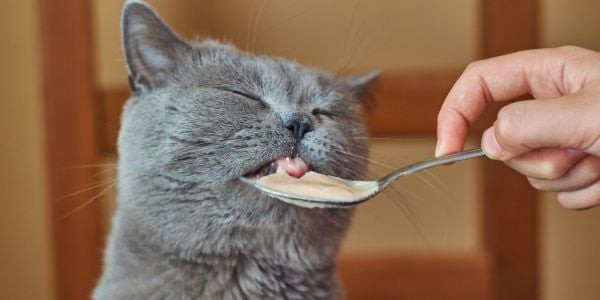 gray cat licking human food off of a spoon
gray cat licking human food off of a spoon
The Claw-ful Truth: Risks and Ingredients to Avoid in Chicken Broth
While chicken broth can be beneficial, certain ingredients commonly found in human-grade broths are toxic or harmful to cats. Understanding these risks is paramount to ensuring your cat’s safety:
- Onions and Garlic: Absolutely Toxic. This is the most critical concern when it comes to chicken broth for cats. Onions and garlic, in all forms (fresh, powdered, cooked, dried), are highly toxic to cats. They belong to the Allium family and contain compounds that cause oxidative damage to red blood cells, leading to a dangerous condition called hemolytic anemia. Even small amounts can be severely harmful. Always check the ingredient list meticulously and ensure the broth is completely free of onions and garlic.
- Excessive Sodium (Salt): Many commercially available chicken broths are high in sodium, which is detrimental to feline health. Too much sodium can lead to dehydration, electrolyte imbalances, and even sodium ion poisoning in cats. Opt for low-sodium or no-sodium added varieties specifically designed for pets or homemade broth with no added salt.
- Artificial Additives and Preservatives: Some broths contain artificial flavors, colors, and preservatives that can be harmful or cause digestive upset in sensitive cats. Choose broths with minimal and natural ingredients.
- Other Toxic Ingredients: Be wary of broths containing other ingredients toxic to cats, such as xylitol (an artificial sweetener), or excessive amounts of herbs and spices that may upset their stomachs.
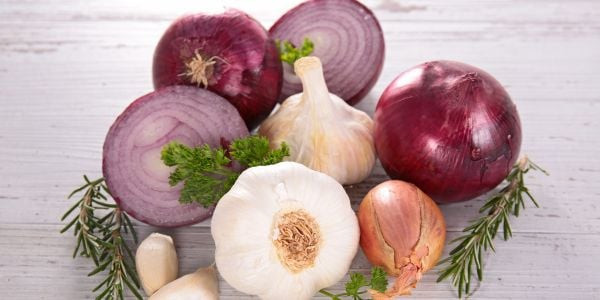 onions and garlic are toxic to cats
onions and garlic are toxic to cats
Beyond Broth: Other Human Foods to Keep Away From Your Cat
While we’re discussing safe and unsafe foods for cats, it’s essential to broaden our scope and remember that many human foods are simply not suitable for feline consumption, and some are downright dangerous. Here’s a reminder of other foods to strictly avoid giving your cat:
- Milk and Dairy Items: Despite the popular image of cats drinking milk, most adult cats are lactose intolerant. Dairy products can cause digestive upset, diarrhea, and vomiting.
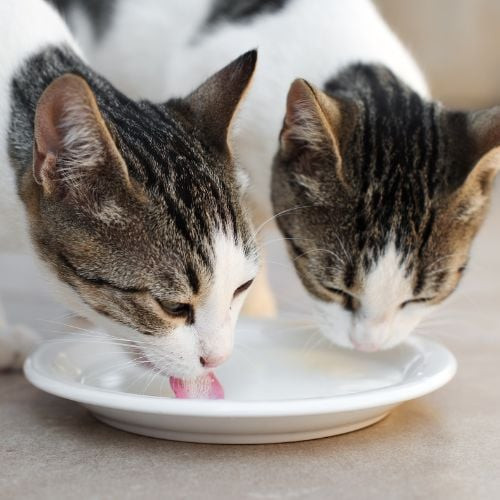 two young cats drinking milk from a saucer
two young cats drinking milk from a saucer
- Alcohol: Even small amounts of alcohol are highly toxic to cats, leading to serious health problems, including liver damage, respiratory failure, coma, and death.
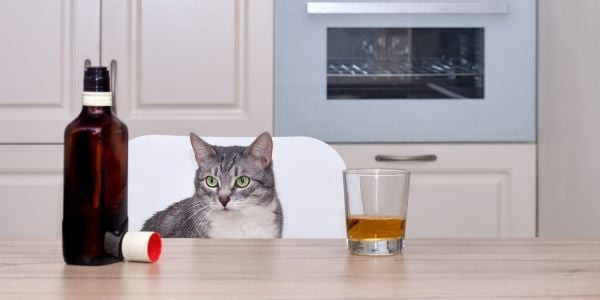 cat peering over the kitchen counter at a glass and bottle of alcohol
cat peering over the kitchen counter at a glass and bottle of alcohol
- Chocolate: Chocolate contains theobromine and caffeine, both toxic to cats. Dark chocolate is particularly dangerous.
 cat inspecting some chocolate candies
cat inspecting some chocolate candies
- Grapes, Raisins, and Currants: These fruits can cause kidney failure in cats, even in small quantities.
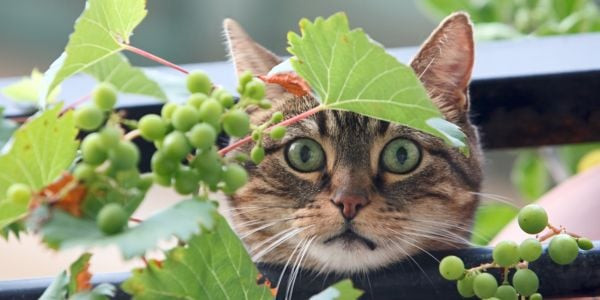 cat peering through a vine full of grapes
cat peering through a vine full of grapes
- Caffeine: Coffee, tea, energy drinks, and caffeine pills are dangerous for cats, causing hyperactivity, tremors, seizures, and even death.
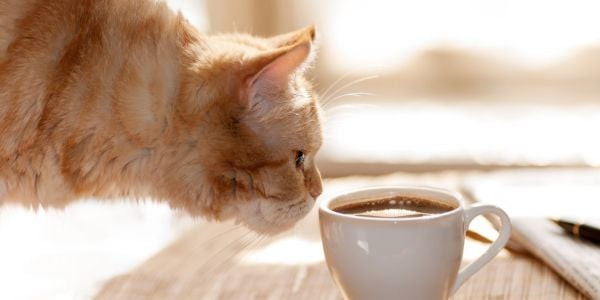 Orange cat sniffing a cup of coffee
Orange cat sniffing a cup of coffee
- Raw Meat and Raw Seafood: Raw meat and seafood can contain harmful bacteria like Salmonella and E. coli, as well as parasites, posing health risks to your cat.
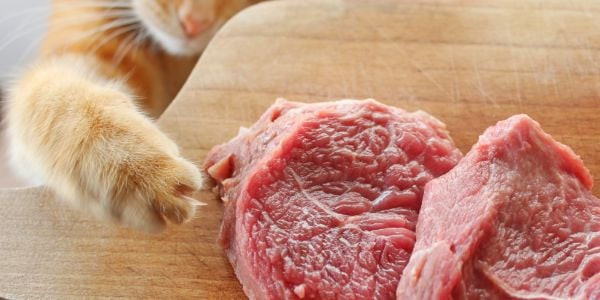 Cat paw swipping at a piece of raw meat on the counter
Cat paw swipping at a piece of raw meat on the counter
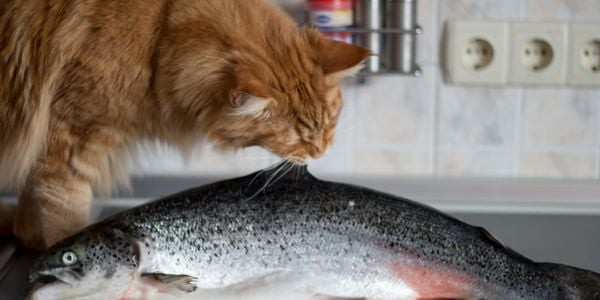 cat biting at the fish of an uncooked fish on the counter
cat biting at the fish of an uncooked fish on the counter
- Raw Liver: While cooked liver in small amounts can be acceptable, excessive raw liver can lead to vitamin A toxicity (hypervitaminosis A).
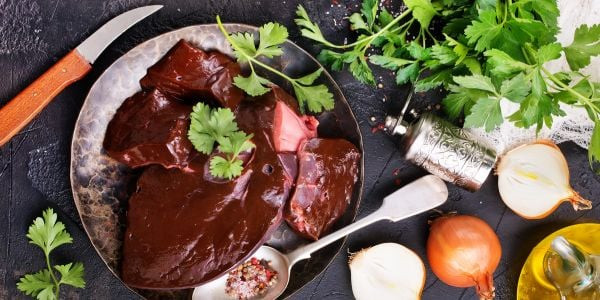 raw liver and onions that are harmful to cats
raw liver and onions that are harmful to cats
- Raw Dough: Yeast in raw dough can cause dangerous expansion in the stomach and alcohol poisoning.
 do not feed your cats dough
do not feed your cats dough
- Raw Eggs: Raw eggs carry a risk of Salmonella and contain avidin, which can hinder biotin absorption.
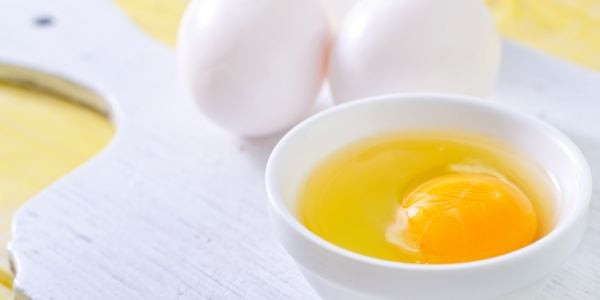 raw eggs that are harmful to cats
raw eggs that are harmful to cats
- Bones: Cooked bones, especially small and brittle ones like chicken bones, can splinter and cause choking or internal injuries.
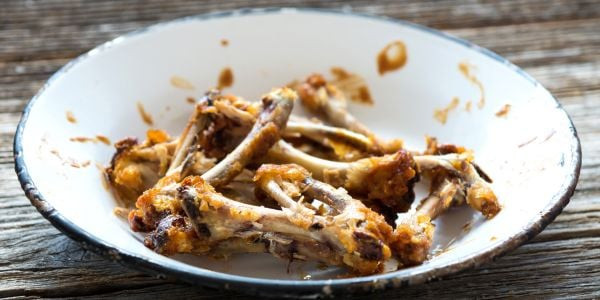 cooked chicken bones in bowl
cooked chicken bones in bowl
- Avocado: Avocado contains persin, which can be toxic to cats in large amounts, and its high-fat content can cause pancreatitis.
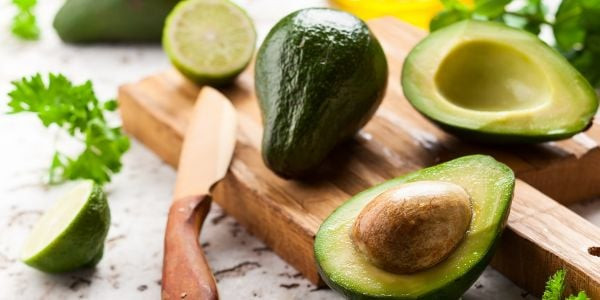 Fresh avocado sliced on a cutting board
Fresh avocado sliced on a cutting board
- Dog Food: Dog food lacks essential nutrients that cats need, like taurine and arachidonic acid, and can lead to nutritional deficiencies if fed long-term.
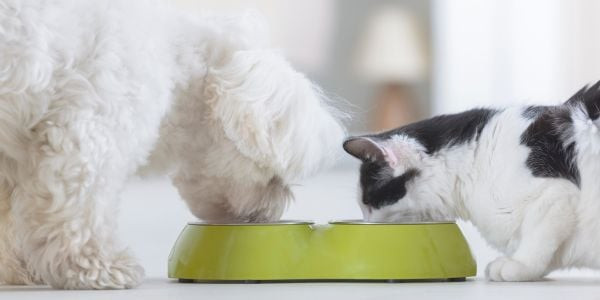 small white dog and black and white cat eating together-canva
small white dog and black and white cat eating together-canva
Choosing the Purrfect Chicken Broth for Your Cat: A Checklist
To safely offer chicken broth to your cat, follow these guidelines:
- Read the Label Carefully: This is non-negotiable! Absolutely ensure the broth contains NO onions or garlic. Check for all forms: onion powder, garlic powder, onion extract, garlic extract, etc.
- Opt for Low Sodium or No Sodium Added: Choose broths specifically labeled as low sodium or “no salt added.” Homemade broth is ideal for controlling sodium content.
- Plain and Unseasoned is Best: Avoid broths with added herbs, spices, or vegetables (beyond carrots or celery, which are generally safe in small amounts). Plain chicken broth is the safest option.
- Consider Pet-Specific Broths: There are chicken broths specifically formulated for cats and dogs available in pet stores. These are often a safer choice as they are designed with pet health in mind and typically exclude harmful ingredients.
- Homemade is a Great Option: Making your own chicken broth at home allows you to control all ingredients. Simply simmer chicken bones (cooked or raw, but remove cooked bones before giving to your cat as a treat), meat, and water for several hours. Crucially, do not add onions, garlic, or salt. You can include a small amount of cat-safe vegetables like carrots. Strain the broth and let it cool completely before serving.
Serving Suggestions and Moderation: A Little Broth Goes a Long Way
Chicken broth should be offered as an occasional treat, not a meal replacement. Here’s how to serve it safely:
- Small Portions: Offer only a small amount, a few tablespoons at a time. Overfeeding can lead to digestive upset, even with safe broth.
- Serve Plain: Serve the broth on its own, either warm or cold, in a separate bowl.
- Mix with Food (Optional): You can mix a small amount of broth with your cat’s regular food to make it more palatable, especially for dry food.
- Fresh is Best: If using homemade broth, store it in the refrigerator and use it within a few days. Discard any uneaten broth after a few hours to prevent bacterial growth.
- Observe Your Cat: After offering broth for the first time, monitor your cat for any signs of digestive upset, such as vomiting or diarrhea. If any adverse reactions occur, discontinue use and consult your veterinarian.
Conclusion: Chicken Broth Can Be a Feline Friend, with Caution
So, can cats have chicken broth? Yes, plain, low-sodium, onion-and-garlic-free chicken broth can be a safe and enjoyable treat for your cat in moderation. It can offer hydration benefits, stimulate appetite, and be a comforting addition to their diet.
However, the critical takeaway is the absolute necessity of avoiding onions and garlic. Always meticulously read labels and choose pet-safe options or homemade broth where you control every ingredient.
By understanding the potential benefits and risks, and by following the guidelines outlined above, you can confidently offer chicken broth as a tasty and safe treat for your feline companion, strengthening your bond and ensuring their well-being. When in doubt about introducing any new food to your cat’s diet, always consult with your veterinarian for personalized advice.

